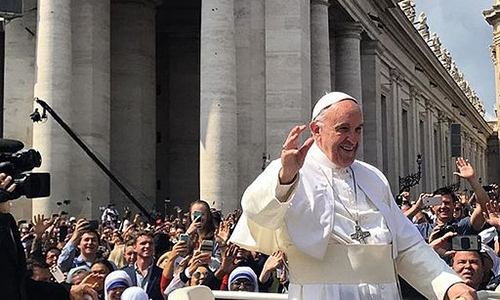 2017
2017
Pope Francis meets crowds outside the Vatican, May 2017.
Hailed as “The People’s Pope” by Time in 2013, Pope Francis shocked his secular admirers with a directive banning gluten-free wafers. Through a process known as transubstantiation, wafers are believed by many Christians to become the actual body of Christ. Whether gluten is central to Christ’s metamorphosis is unclear, but rates of gluten intolerance are on the rise in the United States. The Guardian explains the new guidelines:
Low-gluten bread is allowed but there must be enough protein in the wheat to make it without additives.
Cardinal Robert Sarah of the Vatican’s Congregation for Divine Worship and the Discipline of the Sacraments said the guidance was needed now that Eucharistic bread and wine can be found in supermarkets and “even over the internet.”
In a letter issued last month, Sarah also reminded bishops that the bread should be made by people “distinguished by their integrity”—and that adding fruit or sugar was a “grave abuse.”
“It is altogether forbidden to use wine of doubtful authenticity or provenance,” he added.
But for people who cannot tolerate wine the use of mustum, or must, a thick non-fermented grape juice, is considered “valid matter” for the sacrament.
 1052
1052
Christ appears on the Earl of Mercia’s wafer, from a thirteenth-century abridgement of the Domesday Book, c. 1240. The National Archives, UK.
Wafer ingredients have long been a contentious subject—in 1054 the issue of whether the wafer should be leavened or unleavened precipitated the East–West Schism, where the Byzantine and Roman popes mutually excommunicated each other. Yet Saint Peter Damian, a Benedictine monk recognized for his sweeping reforms and strict attitude toward doctrine, was surprisingly indifferent to the issue in a letter to the archbishop of Ravenna:
Just as it makes little difference whether at Mass we offer wine or unfermented grape juice, so it seems to me, it is all the same whether we offer leavened or unleavened bread. For that “living bread that came down from heaven” (John 6.51), just as he wished to manifest himself under the appearance of wheat, he did so also under the form of the vine. Therefore, it suffices for me to offer either whatever is made from grain or whatever is produced by the vine. Nor am I too careful to inquire whether the bread was preserved in an immature dough until it could ferment, or also whether the grape juice was kept in a vat until it could turn into what one calls wine. But since it is not my purpose here to discuss these matters, I leave them to be handled by others.